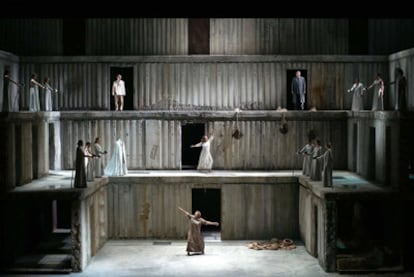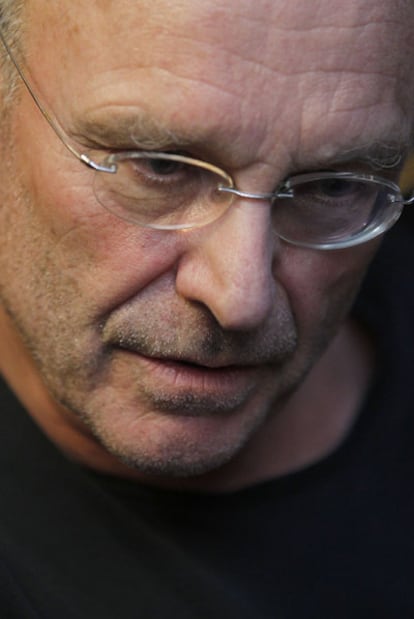Kiefer's electric shock for opera
German artist created the monumental sets for Richard Strauss' 'Elektra,' the work lifting the curtain on a new season at Madrid's Teatro Real
Sometimes, when Anselm Kiefer is busy in his workshop in the outskirts of Paris - perhaps as he listens to Gregorian chants or some late composition by Schubert - something wonderful happens. This something may be caused by a variety of events, but whatever it is, it has to come as a surprise and a shock. Only then, he says, is he able to get started on a project. That's the way his inspiration works. At that same time, he is also visited by a familiar feeling halfway between pleasant and odd: "At that moment, I feel ready for death."
But not to worry. Kiefer, 66, is in great shape. Yet the man whose childhood dream was to become Jesus Christ ("It must have been my genius complex," he says sarcastically) admits that he reflects on his own death every day in order to bring meaning to his life.
Kiefer was in Madrid on September 30 to watch the premiere of Richard Strauss' Elektra at Teatro Real, and check how the monumental scenography that he created for this opera in 2003 still manages to contain this Greek tragedy of assassination and revenge in one single act. He also shared his thoughts on the creative process and the situation of art these days.
This particular staging of Elektra, which is to run in Madrid until October 15, first opened at the San Carlo Theater in Naples eight years ago, and it was the first attempt at opera work for Kiefer, who is best known as an award-winning painter and sculptor.
"I am a painter, not a scenographer. Music is very inspirational to me, like poetry. I only work when I feel a great shock. That's how it all begins," the German artist explains.
And how does it end? It never does. His workshop is filled with projects that he started years back, sometimes decades ago, which he suddenly decided cannot be completed. Kiefer says he could go on like this forever. The problem is that at some point, somebody acquires one of his highly sought-after pieces and he loses control over it.
This expert in shock as a creative state, who is capable of capturing the radical beauty of the instant just before total collapse, does not seem too inspired by the catastrophic situation of today's world, however. "My art does not live off politics. Nor off the present," says the man born in the Black Forest town of Donaueschingen in 1945. "I think in the long term; I read the newspapers three weeks late. It's true we're living on the edge, but part of the blame goes out to the media. Events are like ghosts that appear and disappear."
Biographically a frontier man, Kiefer grew up in Germany, near the border with France. He finally made the move to France because culture "is more Carthesian and logical" there, but the horror of the Holocaust and World War II marked his work forever. And in that sense of being at a historical limit that he describes, art has become a safe haven for investors, for money laundering and for speculators. "It's a giant accident. It happens because they cannot invest in a song, or a poem. Art gets eaten, consumed. It is perfect for it," he says with a smile that reveals the repugnance he feels.
That is why, he explains, "I forbid my work from being shown at art fairs, the most horrid places in the world. I ask my gallerists to sell only to museums, and pay them a bonus for it. Everyone can see the art there, and nobody speculates with it. I don't care how well my work is accepted. I don't research that kind of thing. On the contrary, sometimes I stop sales; the market is overheated. We are experiencing what Adorno predicted 50 years ago: art is entertainment. A weekend thing. And that is not at all what it should be."


Tu suscripción se está usando en otro dispositivo
¿Quieres añadir otro usuario a tu suscripción?
Si continúas leyendo en este dispositivo, no se podrá leer en el otro.
FlechaTu suscripción se está usando en otro dispositivo y solo puedes acceder a EL PAÍS desde un dispositivo a la vez.
Si quieres compartir tu cuenta, cambia tu suscripción a la modalidad Premium, así podrás añadir otro usuario. Cada uno accederá con su propia cuenta de email, lo que os permitirá personalizar vuestra experiencia en EL PAÍS.
¿Tienes una suscripción de empresa? Accede aquí para contratar más cuentas.
En el caso de no saber quién está usando tu cuenta, te recomendamos cambiar tu contraseña aquí.
Si decides continuar compartiendo tu cuenta, este mensaje se mostrará en tu dispositivo y en el de la otra persona que está usando tu cuenta de forma indefinida, afectando a tu experiencia de lectura. Puedes consultar aquí los términos y condiciones de la suscripción digital.








































